
The murder of worshippers at a Manchester synagogue has reignited the flames of Middle Eastern conflict in the West this week. The incident underscores a rising tide of antisemitism, religious hate, and personal violence, occurring on Yom Kippur, Judaism’s holiest day, and on the eve of the third anniversary of the Hamas-led attack on Israelis, which resulted in nearly 1,200 deaths.
The ongoing conflict in Gaza, marked by the tragic loss of 65,000 lives, rampant starvation, and a population constantly fleeing bombardment, is now casting a long shadow over global geopolitics. The situation is exacerbated by the recent peace plan proposal by former U.S. President Donald Trump, which has been met with skepticism and disagreement from various global leaders.
Trump’s Peace Plan: A Mirage of Agreement
Earlier this week, Donald Trump announced a 20-point peace plan alongside Israeli Prime Minister Benjamin Netanyahu, claiming it could settle one of the world’s longest-standing conflicts. “I’ve settled so many wars,” Trump declared, “Yesterday, we might have settled the biggest of them all.” However, the plan’s reception has been far from the “amazing thing” Trump described.
By the week’s end, it became evident that Hamas was unlikely to agree to the proposal. More significantly, the rest of the world, including Israel, seemed less than enthusiastic. According to Al Jazeera, Netanyahu, while initially appearing to support the plan, later clarified in Hebrew that he had not agreed to a Palestinian state and insisted on maintaining Israeli military presence in Gaza.
“Standing next to Donald Trump on Monday, Israeli Prime Minister Benjamin Netanyahu pledged that he had accepted the plan put forward by the United States president to end Israel’s war on Gaza. But a few hours later — and this time speaking in Hebrew rather than English — Netanyahu couched that agreement, telling his domestic audience that he definitely had not agreed to a Palestinian state and the Israeli military would remain in most of Gaza.”
Global Reactions and Misalignments
The announcement has left many world leaders performing diplomatic gymnastics. According to Le Monde, Arab and Muslim nations felt deceived by Netanyahu, with Washington’s endorsement. Amendments proposed by these nations, focusing on revitalizing the Palestinian Authority and establishing a Palestinian state, were reportedly lost in translation.
France, which had recently led efforts to recognize Palestine at the United Nations, found itself in a delicate position. While publicly supporting the plan as a “logical continuation” of its UN efforts, France is wary of offending the U.S. and seeks to mend ties with Israel, fearing diplomatic repercussions.
Meanwhile, Indonesia and Pakistan, representing a significant portion of the world’s Muslim population, were present at the New York meeting but felt misled by the discrepancies between the discussions and the final announcement.
Regional and Global Implications
The global outrage over Gaza is palpable, with protests erupting in cities from Barcelona to Kuala Lumpur. The European Commission has even proposed trade sanctions against Israel, a move that could further isolate the nation on the international stage.
In the U.S., public opinion is shifting. A majority of American voters now oppose additional aid to Israel, and Congressional Democrats are distancing themselves from AIPAC, the prominent pro-Israel lobby group. This shift in sentiment reflects a broader unease with the U.S.’s unwavering support for Israel amidst the ongoing conflict.
Closer to home, countries like Singapore, which have historically maintained strong defense ties with Israel, are experiencing growing disquiet. The dual pressures of U.S. tariffs and the Gaza conflict are straining relations and complicating the geopolitical landscape in Southeast Asia.
The Broader Geopolitical Shift
The geopolitical implications of the Gaza conflict extend beyond immediate regional tensions. According to a study by Singapore academics Yuen Foong Khong and Joseph Chinyong Liow, Southeast Asian countries are gradually shifting their alignment from the U.S. towards China, a trend exacerbated by the current U.S. administration’s policies.
“For decades, … South-East Asia’s leaders have disavowed the notion that they have to choose [between the US and China],” the two authors say. “Even as Beijing and Washington have made their rivalry the dominant fact of global geopolitics, officials in the region repeat the mantra that they can be friends to all.”
As the U.S. continues to support Israel’s actions in Gaza and imposes tariffs on its trading partners, the region’s drift towards China appears inevitable, raising questions about the future of American influence in Asia.
Whether the United States fully grasps the long-term implications of these developments remains uncertain. As the world watches the unfolding drama in Gaza, the repercussions are felt far and wide, challenging existing alliances and reshaping the global order.







